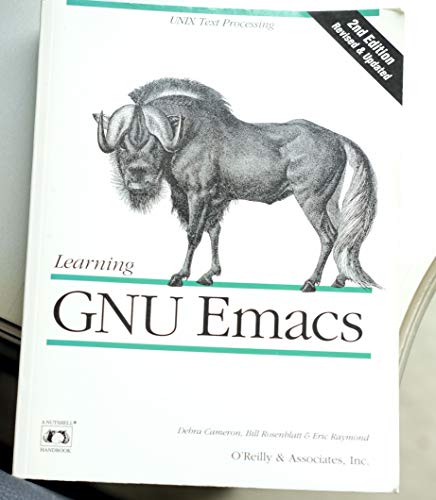GNU Emacs is the most popular and widespread of the Emacs family of editors. It is also the most powerful and flexible. Unlike all other text editors, GNU Emacs is a complete working environment -- you can stay within Emacs all day without leaving. This book tells you how to get started with the GNU Emacs editor. It will also "grow" with you: as you become more proficient, this book will help you learn how to use Emacs more effectively. It takes you from basic Emacs usage (simple text editing) to moderately complicated customization and programming.The second edition of Learning GNU Emacs describes all of the new features of GNU Emacs 19.30, including fonts and colors, pull-down menus, scroll bars, enhanced X Window support, and correct bindings for most standard keys. GNUS, a Usenet newsreader, and ange-ftp mode, a transparent interface to the file transfer protocol, are also described.Learning GNU Emacs, second edition, covers:
- Using Emacs as an Internet Toolkit (to use electronic mail and Usenet news, telnet to other computers, retrieve files using FTP, browse the World Wide Web, and author Web documents)
- Emacs' rich, comprehensive online help facilities
- How to edit files with Emacs
- Using Emacs as a "shell environment"
- How to take advantage of "built-in" formatting features
- How to use multiple buffers, Emacs windows, and X Windows
- Customizing Emacs
- The Emacs interface to the X Window System, which allows you to use a mouse and pop-up menus
- Whys and hows of writing macros to circumvent repetitious tasks
- Emacs as a programming environment
- The basics of Emacs LISP
- How to get Emacs
The book is aimed at new Emacs users, whether or not they are programmers. Also useful for readers switching from other Emacs implementations to GNU Emacs.
Debra Cameron is president of Cameron Consulting. In addition to her love for Emacs, Deb researches and writes about emerging technologies and their applications. Her latest book, Optical Networking: A Wiley Tech Brief, published in 2002 by John Wiley & Sons, covers the practical applications of optical networking and was written in the hope that true broadband will be more widely deployed. Deb also edits OReilly titles, including DNS and Bind, DNS on Windows 2000, TCP/IP Network Administration, HTML and XHTML: The Definitive Guide, Java Security, Java Swing, Learning Java, and Java Performance Tuning. She has presented numerous videos for WatchIT.com, covering security and networking as well as e-business topics. She has moderated roundtables on PlanetIT on advanced networking and intranet design. Deb resides in Gaithersburg, Maryland with her husband Jim and their three children, Meg, David, and Bethany.
Bill Rosenblatt is president of GiantSteps/Media Technology Strategies, a consulting firm in New York City. Before founding GiantSteps, Bill was CTO of Fathom, an online content and education company associated with Columbia University and other scholarly institutions. He has been a technology executive at McGraw-Hill and Times Mirror, and head of strategic marketing for media and publishing at Sun Microsystems. Bill was also one of the architects of the Digital Object Identifier (DOI), a standard for online content identification and DRM.
![]()
